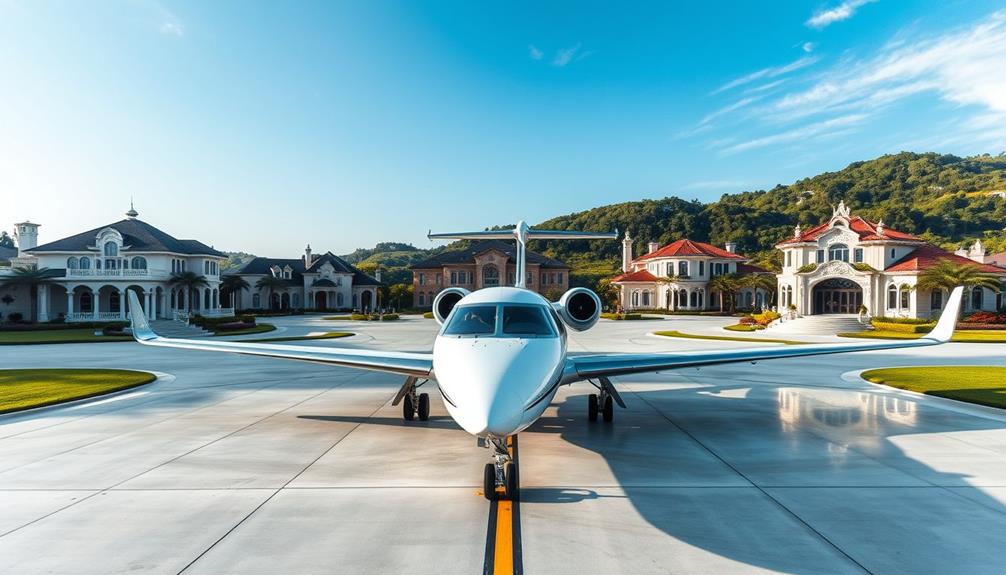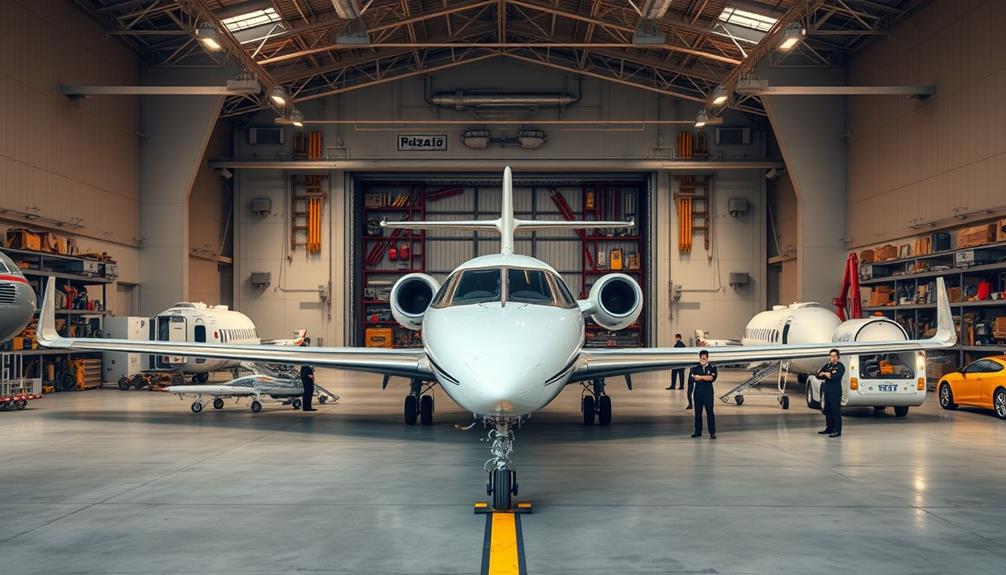To afford a private jet, you'll need a jaw-dropping net worth of at least $25 million. This hefty amount covers both the purchase price, which can range from $8.5 million to $75 million, and ongoing operational costs that can be ten times more than commercial flights. If you're flying privately on a regular basis, aiming for an annual income of at least $1 million is advisable. Remember, in addition to the purchase, you'll face maintenance, crew, insurance, and fuel costs that can add up quickly. There are more insights and alternatives that could make private travel more accessible for you.
Key Takeaways
- To purchase a private jet, expect a net worth of at least $25 million for ownership feasibility.
- Annual income should be a minimum of $745,800, ideally around $1 million for regular private flight use.
- Operating costs can be ten times higher than commercial flights, significantly affecting financial planning.
- Fractional ownership options require initial investments starting at $300,000, making it more accessible for some buyers.
- Ongoing expenses include maintenance, crew salaries, and insurance, which can range from $100,000 to $500,000 annually.
Understanding Private Jet Costs
When it comes to understanding private jet costs, you need to grasp the significant financial commitment involved. Owning a private jet isn't just about the purchase price, which can range from $8.5 million to $75 million.
Additionally, many affluent individuals reflect on diversifying their assets through investments like gold for long-term stability and tax advantages. You also need to take into account the operating costs, which can be staggering. Regular private flights can cost you about ten times more than commercial economy flights, demanding an annual income of at least $745,800 and a net worth of over $25 million for comfortable private travel.
If you opt for fractional ownership, you might spend around $300,000 to $1 million, but that still requires significant financial resources. Hourly rates vary widely, with turboprops costing between $1,300 and $3,000, midsize jets ranging from $4,000 to $8,000, and larger jets hitting $8,600 to $13,000.
While sharing costs with more passengers can lessen expenses, regular private flying typically requires a minimum annual income of $1 million and a net worth exceeding $25 million. Understanding these costs is essential before diving into the world of private aviation.
Required Net Worth for Ownership

To comfortably own a private jet, you need a substantial net worth, typically starting at around $25 million. This minimum net worth guarantees you can manage not just the purchase price, which ranges from $8.5 million to $75 million, but also the ongoing operational costs.
If you're considering private jet ownership, it's vital to evaluate your financial freedom and stability. Investing in options like a Gold IRA can help diversify your assets and protect against inflation, enhancing your financial profile as you prepare for such a significant investment.
Annual income plays an important role too; aiming for at least $1 million is advisable. Regular flying expenses can be about ten times that of commercial economy fares, making financial planning significant.
Hourly operating costs vary widely, with turboprop jets costing between $1,300 and $3,000 per hour and larger jets reaching $8,600 to $13,000.
Many prospective owners often find it beneficial to invest in private real estate or other assets to bolster their financial profile before committing to ownership.
Given the hefty financial responsibilities, it might be wise to explore alternatives like fractional ownership or chartering first. This way, you can enjoy the benefits of private travel without diving into the deep end of private jet ownership just yet.
Income Considerations for Private Travel

When you're thinking about private travel, your income and net worth play a vital role.
To comfortably afford regular flights, you generally need an annual income over $1 million and a net worth of at least $25 million.
Understanding your financial terms is essential in this process, as it helps you make informed decisions about your expenses and potential investments.
Plus, if you're savvy, you might be able to classify some private travel as business expenses to help offset costs.
Annual Income Requirements
Affording regular private flights requires a significant financial commitment, often necessitating an annual income of over $1 million and a net worth of at least $25 million. The costs of private travel are steep, averaging about ten times that of commercial economy tickets, which underscores the need for substantial income.
Additionally, it's wise to consult with a financial advisor to guarantee that your investments, including any potential avoiding scams related to luxury assets, align with your financial goals. If you're considering frequent private travel, aiming for an annual income of around $745,800 is the minimum to maintain a comfortable lifestyle.
For those exploring fractional ownership of a private jet, be prepared for initial investments starting at approximately $300,000 and potentially soaring to $1 million. This option can help offset some costs as you share the jet with others, but it still reflects a significant financial commitment.
If you're flying privately for business, you might find some relief in treating flight expenses as business costs. This can help you leverage tax savings, alleviating some of the financial burdens associated with private flights.
Ultimately, it's vital to assess your annual income and net worth carefully to confirm you can comfortably afford the luxury and convenience that comes with private air travel.
Net Worth Thresholds
Understanding net worth thresholds is fundamental for anyone contemplating private jet travel. To truly enjoy the luxury of private jets, you typically need an annual income of at least $1 million and a net worth exceeding $25 million. This high threshold reflects the reality that private flights can cost about ten times more than commercial economy tickets, so you'll need substantial financial resources for consistent use.
Additionally, having a well-rounded investment strategy, such as considering options in precious metal investments, can further strengthen your financial standing.
If you're considering fractional ownership, be prepared for initial investments starting around $300,000, and total costs that can soar to $1 million. This upfront commitment indicates just how important a robust net worth is for anyone pursuing this lifestyle.
The demand for private flights has surged, especially post-pandemic, highlighting the convenience and safety that high net worth individuals seek. Even if you view private flying as a potential business expense, you still need a strong financial foundation; substantial income and net worth are crucial for long-term viability.
Ultimately, if private jet travel is on your horizon, verify your financial resources align with the significant costs involved.
Business Expense Opportunities
Private jet travel can be a strategic business expense that not only enhances your efficiency but also offers potential tax benefits. For high-net-worth individuals, the opportunity to categorize these flights as business expenses can greatly influence your financial planning and investment income.
Here's a quick overview of how private jet travel can benefit your business:
| Benefit | Description |
|---|---|
| Tax Deductions | Private flights may be deductible as business expenses. |
| Networking Opportunities | Enhanced travel can lead to valuable connections. |
| Time Efficiency | Reduce travel time, allowing for more productive meetings. |
Benefits of Flying Private

When you choose to fly private, you unfasten a range of benefits that elevate your travel experience. One of the most significant advantages of flying private is the time savings. You can skip the long lines associated with commercial flights, using separate terminals designed for private aviation. This means less waiting and more time to focus on your destination.
Additionally, many private jet services offer luxurious amenities similar to those found at top hotels with water parks, ensuring a comfortable and enjoyable journey.
Another key benefit is the flexibility in scheduling. You can select departure times that fit your plans, allowing you to travel on your own terms. Whether you need to leave early or delay your flight, private aviation accommodates your needs.
The personalized attention from staff on private flights enhances your overall travel experience. They cater to your specific needs, ensuring a comfortable journey.
Plus, if you're traveling with family or pets, the spacious environment of private jets makes it easier for everyone to relax, unlike the cramped conditions of commercial flights.
High-end jets, like the G7, come equipped with luxurious amenities, making your travel experience even more enjoyable.
With all these factors, it's clear that for those who can afford it, flying private offers unparalleled benefits.
Expenses Beyond Purchase Price

When you buy a private jet, the expenses don't stop at the purchase price.
You'll need to budget for maintenance, crew salaries, insurance, and hangar fees, all of which can add up quickly.
Additionally, just like investing in a home security system, it's important to take into account the potential costs related to safeguarding your investment, as the value of home security systems can reflect on your overall financial planning.
Understanding these ongoing costs is vital to truly evaluating the affordability of owning a jet.
Maintenance and Operating Costs
Owning a private jet goes far beyond the initial purchase price, as maintenance and operating costs can quickly escalate. Monthly fixed expenses, like pilot salaries, insurance, and hangar fees, contribute greatly to your overall financial commitment.
Additionally, understanding emotional dysregulation and its impact on decision-making can be helpful for owners managing the financial pressures associated with such investments, especially for those who may struggle with impulsive spending habits due to Borderline Personality Disorder (BPD).
As an owner, you'll face variable operating costs too, such as fuel and maintenance, which can create a cash flow roller coaster. For instance, turboprop jets typically cost between $1,300 and $3,000 per flying hour, while larger jets can run from $8,600 to $13,000 per hour.
If you're flying under 100 hours a year, chartering might be a more cost-effective way to manage these operating costs and even generate some revenue to offset expenses.
It's vital to adhere to maintenance manuals and schedule regular inspections. Doing so not only helps guarantee the longevity of your aircraft but also positively impacts the financial dynamics of ownership by preventing costly repairs down the line.
In short, understanding and planning for these ongoing maintenance and operating costs is fundamental for anyone considering the leap into private jet ownership.
Crew and Staffing Expenses
Managing a private jet involves more than just keeping up with maintenance and operating costs; you also need to take into account crew and staffing expenses, which can greatly influence your budget.
Crew salaries are a significant part of these expenses, typically ranging from $100,000 to $300,000 annually per pilot, depending on their experience and the aircraft type. If you're hiring flight attendants, expect to pay an additional $50,000 to $80,000 per attendant each year.
Additionally, considering the importance of choosing a plan that covers vital maintenance can help minimize unexpected costs associated with your jet's upkeep.
Beyond crew salaries, maintenance costs for private jets can average between $100,000 to $500,000 annually, influenced by the aircraft's age and usage.
Insurance premiums also factor in, generally falling between $20,000 to $100,000 each year, depending on the jet's value and history.
Don't forget about hangar fees, which can add $500 to $3,000 monthly, based on location and airport facilities.
All these crew and staffing expenses accumulate quickly, so it's important to plan your budget carefully. The costs of maintaining a skilled and reliable staff are just as significant as the initial investment in your jet.
Insurance and Storage Fees
Steering through the expenses of a private jet doesn't stop after the purchase; you'll need to reflect on insurance and storage fees as ongoing costs.
Insurance costs can range from $20,000 to $50,000 annually or more, depending on your aircraft's value and how frequently you use it. Additionally, it's wise to take into account the potential side effects and interactions of cold medications if you plan on traveling while under the weather.
Next, you'll face storage fees. Renting a hangar can set you back anywhere from $1,500 to $5,000 per month, which varies based on location and hangar size.
Then there are annual maintenance costs, which can add another $100,000 to $300,000 to your budget, depending on your jet type and usage frequency.
Don't forget about fuel costs, which can escalate to $1,200 to $10,000 per hour based on your jet's size and efficiency. These expenses accumulate quickly, so it's essential to factor them into your overall budget.
Ultimately, understanding these additional costs will help you make informed decisions and guarantee you're adequately prepared for the financial commitment of owning a private jet.
Proper planning will let you enjoy the luxury of your new aircraft without the stress of unexpected expenses looming overhead.
Sustainable Travel Options

How can you travel sustainably while enjoying the luxury of a private jet? You have several options that can greatly reduce your carbon footprint.
First, consider choosing private jet operators that utilize sustainable aviation fuel (SAF). These fuels can cut lifecycle carbon emissions by up to 80%, making your luxurious travel more eco-friendly.
Additionally, you can look into carbon offset programs. While their effectiveness is debated, purchasing carbon credits can help compensate for the emissions from your flight, allowing you to balance your environmental impact.
Another smart choice is to opt for fuel-efficient aircraft. Many manufacturers are now developing jets that consume less fuel per flight, making them a more sustainable option for your travels.
Lastly, embrace eco-friendly travel options like shared flights or chartering, which can help further reduce your carbon footprint.
Conclusion
So, if you're dreaming of soaring through the skies in your own private jet, remember it's more than just a purchase—it's a lifestyle. With the right net worth and income, you can access a world of luxury and convenience that feels like gliding on a cloud. Just keep in mind the hidden costs and consider sustainable options. With a little planning, you can turn that dream into a breathtaking reality, leaving the ordinary far below.









